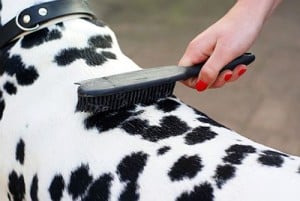Good day and welcome everyone!
This is Sharda with a wonderful newsletter about dog grooming.
Today we will talk about choosing the right dog grooming brush kit!
There are several staple elements of the dog grooming and all of them can help to boost the health of your dog’s skin and coat.
Brushing is undoubtedly one of them and is actually one of the most important elements because of all of the benefits it brings.
For example, you can see the improvement in the health of your dog’s coat but it also boosts the skin and the supply of nutrients to it because it encourages the flow of blood underneath the skin.
Your reaction and enthusiasm towards brushing may be along the lines of “Great” I’ll go and grab the brush then!” However, your dog will probably not see it that way to start with, especially when it is dealing with knots and tangles.
In fact, unless you go about it the right way you will have to pin your dog down to be able to do it again after the first time. There are many elements of brushing to consider and much depends on the coat of your dog. Brush is one of those proper and needed dog grooming tools or supplies you need to have.
However, the information on these pages will give you a good starting place from which you can work.
CHOOSING THE RIGHT BRUSH
You cannot brush your dog without a brush so the first thing that you need to do is take the time to make sure that you choose the right one. You have to take a lot of factors into account when trying to choose the right ones.
For example, the coat plays a big part because longer and coarser quotes will be more prone to matting and tangling than shorter coats. Similarly, harsh brushes are likely to damage the skin on shorter coats because they are no real furry protection available.
As such, brush selection is a little difficult but it is an important decision to make so it is essential to ensure that you take your time and make the right choice.
There are numerous brushes that you can choose from. To recap though, there are perhaps five that you have to choose from:
Bristle Brush – The most common of brush types, natural bristles are designed to work in harmony with the skin and the coat in order to get the best possible results. There are various sizes available so you should choose one that suits your dog size and not focus on the coat.
The larger the dog, the larger the bristle brush should be. However, there are certain bristles that suit certain coats as well. If your dog has a long coat then wide spaced and longer bristles would suit it best. Tighter bristles are better for short haired coats.
Wire Pin Brush – Pin brushes and wire brushes are ideal for longer coats as well as coats that are curly because they tend to be much stronger than bristle brushes and push through tangles really well. However, they will hurt smooth coated dogs and thus damage the skin so they are best avoided for those dogs.
Slicker Brush – A slicker brush should be used in conjunction with a wire pin brush because it should be used afterwards to smooth the coats of longer haired dogs. Slicker brushes are renowned for removing mats and tangles and so are ideal for double coated dogs but again should be avoided on single coated dogs.
Undercoat Rake – The undercoat rake is pretty self explanatory. If your dog has a double coat then you should use one to remove any dead and loose hairs from the undercoat of double coated dogs.
It may be that you have a medium or long haired dog, a small or large dog… It really does not matter what they look like or what breed they are. If you have a double coated dog then you need this brush.
Dog Comb – Every single breed needs a comb because it is essential for getting out tangles, smoothing the fur down after a bath and even to take care of fleas as well. It is the one piece of equipment that is not dependent on coat at all so invest in a god brush.
The ideal combinations for all coat types vary from dog to dog but most owners will only need a bristle brush and a comb. However, you may want to consider having a wire pin brush as well if you have a long coated breed. After all, you can chop and change as and when required.
I hope you learned a lot from today’s dog grooming newsletter.
I will be back for more!
Warmly,
Sharda Baker

